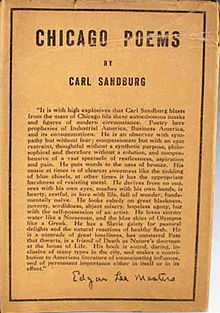Fog (poem)
The fog comes
on little cat feet.
It sits looking
over harbor and city
on silent haunches
and then moves on.
"Fog" is a poem by Carl Sandburg. It first appeared in Sandburg's first mainstream collection of poems, Chicago Poems, published in 1916.
Sandburg has described the genesis of the poem. At a time when he was carrying a book of Japanese "Haiku", he went to interview a juvenile court judge, and he had cut through Grant Park and saw the fog over Chicago harbor. He had certainly seen many fogs before, but this time he had to wait forty minutes for the judge, and he only had a piece of newsprint handy, so he decided to create an "American Haiku".[1]
Anthologies
This poem has been frequently anthologized.[2] Perhaps the earliest was Untermeyer, Louis, ed. (1919), Modern American Poetry, Harcourt, Brace and Howe.
Reception
Harriet Monroe, the editor of Poetry who first published several of the poems[3] that went into Chicago Poems, said as part of her review of that collection:[4]
I remember the emotion with which I first read many of these poems ... That first conviction of beauty and power returns to me as I read them again. This is speech torn out of the heart, because the loveliness of ... a fog coming on "little cat feet,"—the incommunicable loveliness of the earth, of life—is too keen to be borne ....
Staging
In 1959 and 1960, Bette Davis and her husband Gary Merrill toured the nation, putting on The World of Carl Sandburg, a dramatic staged reading of selected Sandburg poetry and prose, culminating in a one month run on Broadway (with Leif Erickson instead of Merrill). One review described highlights of Davis's performance, including:
... as if on catlike feet, she makes "Fog" seem new; ...—Howard Taubman, New York Times, 9/15/1960, p. 44
Recordings
- TC 1253
- A vinyl LP of Carl Sandburg reading some of his poems, Carl Sandburg reading Fog and other poems was released on Caedmon (TC 1253) in 1968.
- Description: 2s. : 331⁄3 rpm, stereo ; 12in.
- An online link to Sandburg reading "Fog" is maintained by the state of Illinois.[5]
Influence
The poet Richard Brautigan wrote a parody of the poem in about 1956[6]
The poem was once loosely paraphrased on a 2008 episode of the The McLaughlin Group during which host John Mclaughlin and conservative commentator Pat Buchanan discussed the candidacy of 2008 Republican Presidential nominee John McCain. This exchange was later revisited when Andrew WK included a version of the conversation in a rock anthem song he composed which was featured on Public Radio International.[7][8][9]
References
- ↑ Corwin, Norman. The World of Carl Sandburg. Harcourt, Brace & World. pp. 30, 32.
- ↑ Van Wienen, Mark (March 1991). "Taming the Socialist: Carl Sandburg's Chicago Poems and its Critics". American Literature (Duke University Press) 63 (1): 89–103. JSTOR 2926563., p. 94.
- ↑ But not "Fog".
- ↑ Monroe, Harriet (May 1916). "Chicago Granite:Chicago Poems by Carl Sandburg". Poetry 8 (2): 90–93. JSTOR 20570797. p. 91.
- ↑ Carl Sandburg (1968). "Fog". Carl Sandburg Reading Fog and other Poems. Retrieved 2014-01-19. Note: the website refers to the 1962 recording Carl Sandburg Reading His Poetry, Caedmon Records, TC 1150, 1962, but this is a mistake, since "Fog" is not on that record. See discography at "Carl Sandburg Reading His Poetry". Discogs. Retrieved 2014-01-19.
- ↑ Brautigan, Richard (Winter 1956). "A Correction". The Caxton Poetry Review 1 (2).
- ↑ "Fair Game succumbs to complications of weak carriage". Current. 2008-05-27. Retrieved 2013-08-16.
- ↑ "Andrew W.K. and John McLaughlin Are the Burt Bacharach and Hal David of ‘McLaughlin Group’–Inspired Party Anthems". Vulture. 2008-03-06. Retrieved 2013-08-16.
- ↑ Barthel, Mike (2008-12-08). "No. 80: Andrew WK, “McLaughlin Groove”". Idolator. Retrieved 2013-08-16.
| ||||||||||||||||||||||||||||||||||||||||||||||||||||||
